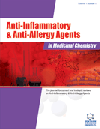-
s Progranulin Regulates Inflammation and Tumor
- Source: Anti-Inflammatory & Anti-Allergy Agents in Medicinal Chemistry, Volume 19, Issue 2, Jun 2020, p. 88 - 102
-
- 01 Jun 2020
Abstract
Progranulin (PGRN) mediates cell cycle progression and cell motility as a pleiotropic growth factor and acts as a universal regulator of cell growth, migration and transformation, cell cycle, wound healing, tumorigenesis, and cytotoxic drug resistance as a secreted glycoprotein. PGRN overexpression can induce the secretion of many inflammatory cytokines, such as IL-8, -6,-10, TNF-α. At the same time, this protein can promote tumor proliferation and the occurrence and development of many related diseases such as gastric cancer, breast cancer, cervical cancer, colorectal cancer, renal injury, neurodegeneration, neuroinflammatory, human atherosclerotic plaque, hepatocarcinoma, acute kidney injury, amyotrophic lateral sclerosis, Alzheimer’s disease and Parkinson’s disease. In short, PGRN plays a very critical role in injury repair and tumorigenesis, it provides a new direction for succeeding research and serves as a target for clinical diagnosis and treatment, thus warranting further investigation. Here, we discuss the potential therapeutic utility and the effect of PGRN on the relationship between inflammation and cancer.


